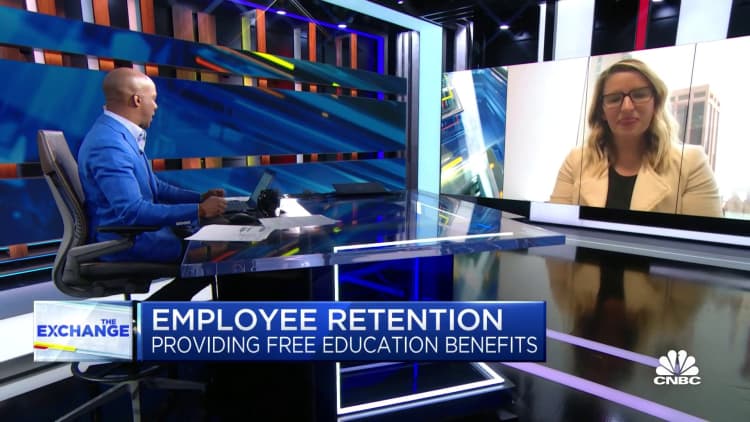With 1.6 million employees in the U.S., the country's largest private-sector workforce, Walmart is perpetually hiring people at its more than 5,200 retail stores, as well as corporate headquarters in Bentonville, Arkansas. That herculean task took a turn this fall, when the company said that many of those corporate jobs will no longer require a college degree.
"We're rewriting job descriptions for our campus (headquarters) jobs to factor in the skills people possess, alongside any degrees they hold," Walmart said in a corporate blog post in late September co-authored by Lorraine Stomski, senior vice president, associate learning and leadership, and Julie Gehrki, vice president, philanthropy. "To be considered for the job, you can have a related college degree or possess the skills needed for the job, whether through previous experience or other forms of learning."
The timing of Walmart's announcement coincides with a trend among many large employers in sectors from tech to autos and consulting, including Google, IBM, Tesla, GM and Accenture, toward skills-based hiring to fill what are sometimes called "new-collar" jobs. It also arrives amid greater debate over the value of a college education, long regarded as a prerequisite for landing a corporate job and building a career, and concerns about the debt loads being carried by students. A tight labor market, with more emphasis on efforts to diversify workforces and the introduction of generative artificial intelligence into employees' lives, are changing approaches to recruiting and retention as well.
"We truly believe that all learning counts," Stomski said in an interview conducted in late October. "We want to look at these jobs and say, What do they really require? Yes, many of them may require a college degree, but a lot of them may not. We're not saying college degrees don't count. We're saying it's an either/or scenario for many of our campus jobs."
The starting point for developing Walmart's new hiring process, Stomski said, will be to identify the in-demand corporate jobs emerging across its business and the specific skills required for them, then determine whether a college degree is necessary. Either way, employees can utilize the company's upskilling and reskilling platform, Live Better U, with free college tuition at partner institutions including Southern New Hampshire University, the University of Arizona and the University of Denver. "If you need a college degree, you can get it debt-free," Stomski said.
Walmart is among the major retailers, Target is another example, which has worked with education platform Guild to provide access to a debt-free degree and short-form learning programs.

Besides bachelor and associate degree programs, Live Better U also offers 25 short-term certificates — skills-building courses that take less than a year to complete — in corporate-level fields such as data analytics, cybersecurity (where the gap between open positions and available talent is wide), supply chain management and business economics. "In prior years, people would pursue a cybersecurity college degree," Stomski said. "Now they can get a cybersecurity certificate in six to nine months."
Ben Wildavsky, a visiting scholar at the University of Virginia who studies education and skills-building, and the author of "The Career Arts: Making the Most of College, Credentials, and Connections," said he thinks Walmart is taking the right approach. "They are trying to create an ecosystem within the organization that builds skills, but also allows for credit for short-term credentials that can build toward a degree in many cases. It all is premised on things fitting together into people's lives in a way that's going to be workable for them," he said.
At the same time, Wildavsky stressed that being dismissive about the value of a college degree is a mistake. "We need to accept that what economists call the human capital theory of degree value is really true. What that means is, when you go to college and get a degree, it's not just a piece of paper. People really learn things in college."
Walmart stresses that point, too.
"This is not about getting rid of college degrees," Stomski said, and she added that many of Walmart's corporate jobs will still require them. "It could be an 'and,' meaning you could come with some college and supplement that with skills and experience," she said.
Building a broader education system and career pathway
Along with targeted skills attained in popular majors such as teaching, nursing and computer science, a broad college education also imparts non-cognitive skills — often referred to as soft skills — according to Wildavsky. "They learn communication abilities, how to work in teams on projects, how to plan and execute over time. That's why it's so important to do what Walmart is doing," he said, "which is to try to make all this one broader system."
Stomski agreed that college students can learn to think critically and to problem-solve, but "those [soft skills] are not exclusive to college degrees," she said. "You can get those experiences by serving in the Marines," she added.
The corporate world isn't the only major employment market where this shift is underway, and arguably, it is already more established in the public sector. On Tuesday, Minnesota announced the state would no longer require degrees for most state jobs, becoming the latest in a growing list of states to drop two- or four-year degree requirements.
Examples of Walmart corporate roles that will not require college degrees including positions in operations and merchandising, but Stomski declined to be more specific. As to the number of jobs that would fall under this new rubric, "It's in the realm of possibility that it's going to be hundreds," she said. "We're in the beginning stages, but that's what we estimate."
Generative AI, meanwhile — which has been on the public radar only for about a year, since OpenAI released ChatGPT — is rapidly becoming a skill that could impact all types of jobs in most every business sector, including retailing. To that end, in August, Walmart launched an internal generative AI tool called My Assistant to all its campus workers. "From speeding up the drafting process, to serving as a creative partner, to summarizing large documents, My Assistant has the potential to change how our associates work and solve problems," the company said in a post on LinkedIn.
To familiarize its headquarters workforce with the chatbot, Walmart has initiated a training program that includes an online tutorial. "We've created a very safe playground, where associates can go into My Assistant to ask questions and learn how to use prompts," Stomski said. "We're starting there so we can actually be the coaches to the business as we start to get more intimate with AI."
Another factor in Walmart's shift to skills-based hiring is to help promote diversity among its corporate workforce, Stomski said. "We are removing unnecessary barriers so we can access a broader, more diverse talent pool," she said. "One of those barriers is degree requirements. If we shift to an either/or strategy, we open up the candidate pool significantly to a more diverse group that's reflective of the communities we serve."
Colleen Ammerman, director of the race, gender and equity initiative at Harvard Business School, said that a talent-management strategy like Walmart's avoids randomly trying to boost numerical targets. "It's just smart for companies to think about how to access the best talent and not have arbitrary barriers, whether it's a crude screening tool — do you have a four-year degree? — or more subtle barriers, in terms of how we perceive people of different identities," she said.
Ultimately, Stomski said, Walmart's revamped hiring process "is going to unlock the potential for a lot of our [front line and corporate] associates to build their careers and access higher-paying jobs, which helps them save money and live better. It's going to affect every single people practice in a good way."
Join CNBC's Evolve Global Summit virtually on Thursday, November 2, where we will gather leaders and innovators from around the world for provocative conversations and to share strategies and tactics necessary for adapting, innovating and transforming in this new era of business. Register here.







